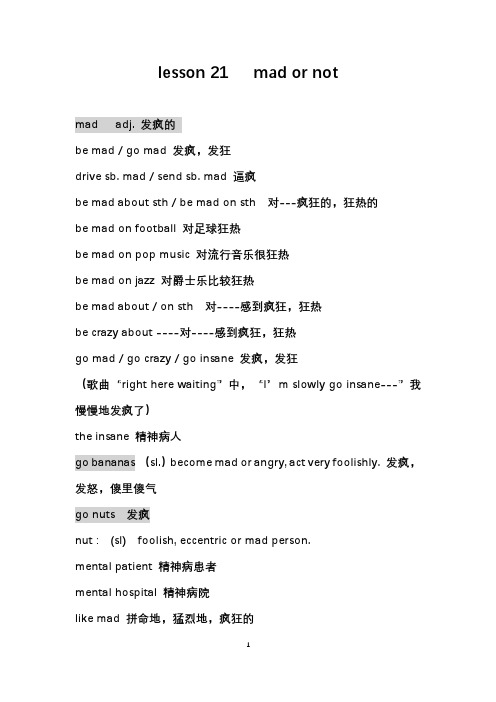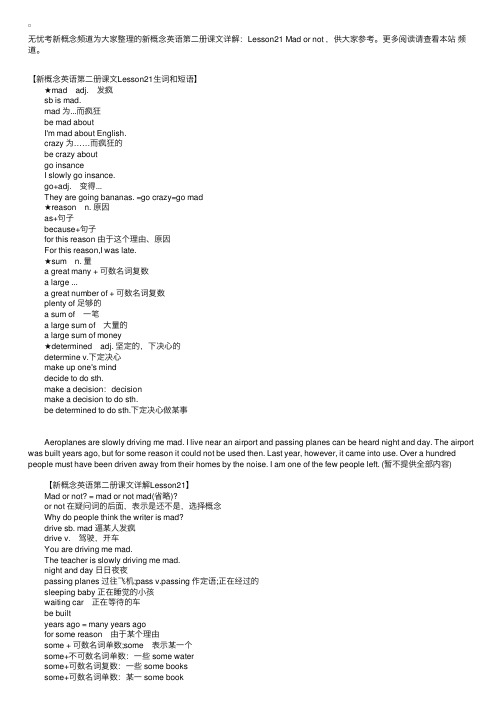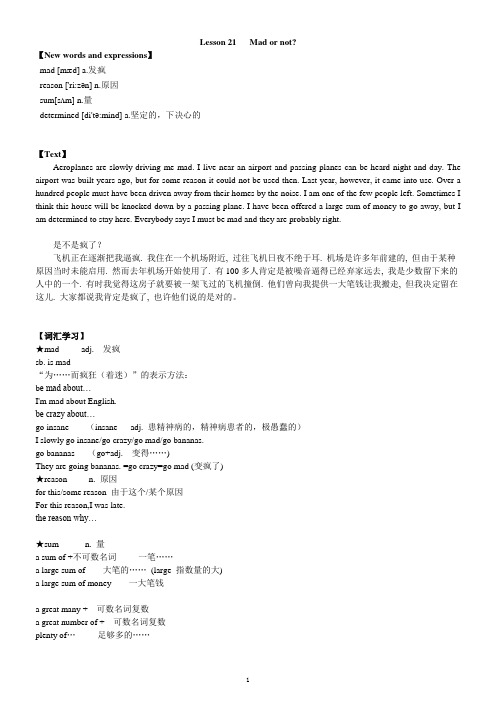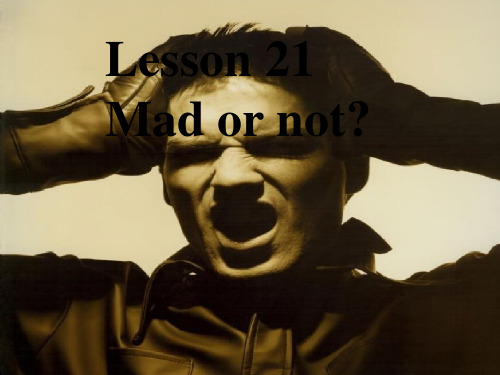新概念英语第二册学生用书Lesson21.
新概念英语第二册笔记 Lesson 21 mad or not

lesson 21 mad or notmad adj. 发疯的be mad / go mad 发疯,发狂drive sb. mad / send sb. mad 逼疯be mad about sth / be mad on sth 对---疯狂的,狂热的be mad on football 对足球狂热be mad on pop music 对流行音乐很狂热be mad on jazz 对爵士乐比较狂热be mad about / on sth 对----感到疯狂,狂热be crazy about ----对----感到疯狂,狂热go mad / go crazy / go insane 发疯,发狂(歌曲“right here waiting”中,“I’m slowly go insane---”我慢慢地发疯了)the insane 精神病人go bananas (sl.)become mad or angry, act very foolishly. 发疯,发怒,傻里傻气go nuts 发疯nut : (sl) foolish, eccentric or mad person.mental patient 精神病患者mental hospital 精神病院like mad 拼命地,猛烈地,疯狂的reason1)n. 原因reasonable adj. 合情合理的,良好的尚可的at a reasonable price 以合理的价格eg. The plane is in a reasonable condition. 飞机状态良好。
cause 导致某事的起因the cause of the fire 大火的起因eg. Smoking is one of the causes of lung cancer. 吸烟是肺癌的起因之一。
for this reason 由于这个原因for some reason (some:某一个,加可数名词单数时,翻译为“某个”)由于某个原因= for a certain reasongive a reason 提出理由the root reason 根本原因the reason is that ---- ----的理由是----the reason why ---is that ----- ----的理由是----eg. The reason why I study English is that I envy those who speak English well。
新概念英语第二册课文详解:Lesson21Madornot

⽆忧考新概念频道为⼤家整理的新概念英语第⼆册课⽂详解:Lesson21 Mad or not ,供⼤家参考。
更多阅读请查看本站频道。
【新概念英语第⼆册课⽂Lesson21⽣词和短语】 ★mad adj. 发疯 sb is mad. mad 为...⽽疯狂 be mad about I'm mad about English. crazy 为……⽽疯狂的 be crazy about go insance I slowly go insance. go+adj. 变得... They are going bananas. =go crazy=go mad ★reason n. 原因 as+句⼦ because+句⼦ for this reason 由于这个理由、原因 For this reason,I was late. ★sum n. 量 a great many + 可数名词复数 a large ... a great number of + 可数名词复数 plenty of ⾜够的 a sum of ⼀笔 a large sum of ⼤量的 a large sum of money ★determined adj. 坚定的,下决⼼的 determine v.下定决⼼ make up one's mind decide to do sth. make a decision:decision make a decision to do sth. be determined to do sth.下定决⼼做某事 Aeroplanes are slowly driving me mad. I live near an airport and passing planes can be heard night and day. The airport was built years ago, but for some reason it could not be used then. Last year, however, it came into use. Over a hundred people must have been driven away from their homes by the noise. I am one of the few people left. (暂不提供全部内容) 【新概念英语第⼆册课⽂详解Lesson21】 Mad or not? = mad or not mad(省略)? or not 在疑问词的后⾯,表⽰是还不是,选择概念 Why do people think the writer is mad? drive sb. mad 逼某⼈发疯 drive v. 驾驶,开车 You are driving me mad. The teacher is slowly driving me mad. night and day ⽇⽇夜夜 passing planes 过往飞机;pass v.passing 作定语;正在经过的 sleeping baby 正在睡觉的⼩孩 waiting car 正在等待的车 be built years ago = many years ago for some reason 由于某个理由 some + 可数名词单数;some 表⽰某⼀个 some+不可数名词单数:⼀些 some water some+可数名词复数:⼀些 some books some+可数名词单数:某⼀ some book however ⽤于句⾸,句中,⽤逗号隔开 come into use : into prep.; use n.投⼊使⽤;主动概念,没有被动式 be used 被动表⽰ 被使⽤ over a hundred ... must have done 过去发⽣,推测 must have been done 被动 drive 逼 away from 从某地离开 their homes 他们的家;house 房⼦/home 家 by the noise 被噪⾳ over a hundred people 主语 must have been done 谓语 away from 从某地离开;out of somewhere 从某地出来 one of ... 之⼀ left:leave 过去分词,表⽰被留下来的 left作定语放在被修饰词的后⾯,剩下的……东西 I have a bag left. There is ten cents left in my pocket. will be done 被动语态的将来时态 knock down 撞到 offter:given, give sb. sth./give sth.to sb.双宾语 双宾语的被动语态:主语有两种可能;以sb.做主语或以sth.做主语 被动语态的标志 be done give sb. sth. 被动 sb. be given sth. give sth. to sb. 被动 sth. be given to sb. ⽤离动词最近的宾语做主语 原⽂句型结构 sb. be offered sth. to不定式表⽰⽬的 go away :leave be determined to do sth.下定决⼼做某事 Everybody says... 从句 I must be mad they are probably right.他们也许是对的 probably adv.很可能 ⽂章重点 1. 复杂句型结构:over a hundred people... 2. 双宾语的被动语态 3. drive sb.away from somewhere; drive sb. mad 4. passing plane; -ing作定语,表⽰正在。
完整版新概念英语第二册学生用书Lesson21

是不是疯疯了?Lesson 21 Mad or not? 是不是First listen and then answer the question.听录音,然后回答以下问题。
Why do people think the writer is mad?Aeroplanes are slowly driving me mad. I live near an airport and passing planes can be heard night and day. The airport was built years ago, but for some reason it could notbe used then. Last year, however, it came into use. Over a hundred people must have been driven away from their homes by the noise. I am one of the few people left. Sometimes I think this house will be knocked down by a passing plane. I have been offered a large sum of money to go away, but I am determined to stay here. Everybodysays I must be mad and they are probably right.和短语语New words and expressions 生词和短mad(1. 1/m$d/adj. 发疯sum(1. 7/sm/n. 量reason(1. 3/'ri:z+n/n. 原因determined(1. 8/di't*:mind/adj. 坚定的,下决心的文注释释课文注Notes on the text1 Aeroplanes are slowly driving me mad.飞机正在逐渐把我逼疯。
(完整版)新概念英语2Lesson21

Lesson 21 Mad or not?【New words and expressions】mad [mæd] a.发疯reason ['ri:zən] n.原因sum[sʌm] n.量determined [di'tə:mind] a.坚定的,下决心的【Text】Aeroplanes are slowly driving me mad. I live near an airport and passing planes can be heard night and day. The airport was built years ago, but for some reason it could not be used then. Last year, however, it came into use. Over a hundred people must have been driven away from their homes by the noise. I am one of the few people left. Sometimes I think this house will be knocked down by a passing plane. I have been offered a large sum of money to go away, but I am determined to stay here. Everybody says I must be mad and they are probably right.是不是疯了?飞机正在逐渐把我逼疯. 我住在一个机场附近, 过往飞机日夜不绝于耳. 机场是许多年前建的, 但由于某种原因当时未能启用. 然而去年机场开始使用了. 有100多人肯定是被噪音逼得已经弃家远去, 我是少数留下来的人中的一个. 有时我觉得这房子就要被一架飞过的飞机撞倒. 他们曾向我提供一大笔钱让我搬走, 但我决定留在这儿. 大家都说我肯定是疯了, 也许他们说的是对的。
新概念英语第二册第21课

2021/5/18
27
7.Everybody says I must be mad and they are probably right.
1)Everybody不定代词作主语谓语动词用单数 2)must be 表对现在事实的肯定推测
2021/5/18
2021/5/18
18
reason n. 原因
for this reason 由于这个原因 For this reason, I was late.由于这个原因,我迟到了。 For what reason? 是为了什麽原因? bring sb. to reason 使某人讲理
2021/5/18
19
极愚蠢的)
④go bananas (go+adj. 变得……) They are going bananas. =going crazy=going mad (变疯了)
I slowly go insane/go crazy/go mad/go bananas. 3.be mad at sb 生某人的气
16
mad adj 发疯的
2021/5/18
17
mad adj 发疯的
1.sb. is mad 2.“为……而疯狂(着迷)”的表示方法: ①be mad about… I'm mad about English. ②be crazy about… ③go insane (insane adj. 患精神病的,精神病患者的,
28
• 动词语态
• 英语动词有两种语态
• 主动语态:主语是动作的执行者 • 被动语态:主语是动作的承受者
• Many people speak English.(主动语态) • English is spoken by many people.(被动语态)
新概念第二册第21课课件

They must test this new car. must _______ be tested This car_______ __________.
S+ can/may/must/should + be+ P.P
S+ will+be+ P.P.
一般将来时:
现在进行时: S+ am/is/are + being + P.P.
现在完成时: S+ have/has + been+ P.P. 过去进行时:
S+ was/were+being+ P.P.
He will repair your watch.
主 谓
宾(承受者)
The room will be cleaned by Tom tomorrow.
一般将来时:will be+动词的过去分词
4.Amy can take good care of Gina . Gina can be taken good care of by Amy.
情态动词: S+ can/may/must/should + be+过去分词
He drives his car very badly.
The farmer drove the cattle into the field.
Our army drove the enemy back.
During the war, many people were driven out of their homes.
新概念英语第二册学生用书Lesson21.(最新整理)
是不是疯疯了?Lesson 21 Mad or not? 是不是First listen and then answer the question.听录音,然后回答以下问题。
Why do people think the writer is mad?Aeroplanes are slowly driving me mad. I live near an airport and passing planes can be heard night and day. The airport was built years ago, but for some reason it could not be used then. Last year, however, it came into use. Over a hundred people must have been driven away from their homes by the noise. I am one of the few people left. Sometimes I think this house will be knocked down by a passing plane. I have been offered a large sum of money to go away, but I am determined to stay here. Everybody says I must be mad and they are probably right.和短语语New words and expressions 生词和短mad(1. 1/m$d/adj. 发疯sum(1. 7/sm/n. 量reason(1. 3/'ri:z+n/n. 原因determined(1. 8/di't*:mind/adj. 坚定的,下决心的文注释释Notes on the text 课文注1 Aeroplanes are slowly driving me mad.飞机正在逐渐把我逼疯。
(完整版)新概念英语第二册学生用书Lesson21.
是不是疯疯了?Lesson 21 Mad or not? 是不是First listen and then answer the question.听录音,然后回答以下问题。
Why do people think the writer is mad?Aeroplanes are slowly driving me mad. I live near an airport and passing planes can be heard night and day. The airport was built years ago, but for some reason it could not be used then. Last year, however, it came into use. Over a hundred people must have been driven away from their homes by the noise. I am one of the few people left. Sometimes I think this house will be knocked down by a passing plane. I have been offered a large sum of money to go away, but I am determined to stay here. Everybody says I must be mad and they are probably right.和短语语New words and expressions 生词和短mad(1. 1/m$d/adj. 发疯sum(1. 7/sm/n. 量reason(1. 3/'ri:z+n/n. 原因determined(1. 8/di't*:mind/adj. 坚定的,下决心的文注释释Notes on the text 课文注1 Aeroplanes are slowly driving me mad.飞机正在逐渐把我逼疯。
新概念英语(第二册)精读笔记-Lesson 21 Mad or not
Lesson 21 Mad or not一、原文Aeroplanes are slowly driving me mad.I live near an airport and passing planes can be heard night and day. The airport was built years ago, but for some reason it could not be used then. Last year, however, it came into use.Over a hundred people must have been driven away from their homes by the noise. I am one of the few people left. Sometimes I think this house will be knocked down by a passing plane.I have been offered a large sum of money to go away, but I am determined to stay here. Everybody says I must be mad and they are probably right.二、参考译文飞机正在逐渐把我逼疯。
我住在一个机场附近,过往飞机日夜不绝于耳。
机场是许多年前建的,但由于某种原因当时未能启用。
然而去年机场开始使用了。
有100多人肯定是被噪音逼得已经弃家远去,我是少数留下来的人中的一个。
有时我觉得这房子就要被一架飞过的飞机撞倒。
他们曾向我提供一大笔钱让我搬走,但我决定留在这儿。
大家都说我肯定是疯了,也许他们说的是对的。
三、精读笔记Part 1 词汇、短语1、drive(1)VEHICLE 交通工具to operate a vehicle so that it goes in a particular direction驾驶;开车I drove to work this morning. 我今天早上开车去上的班。
新概念第二册Lesson 21 Mad or Not
Calm down and be reasonable 冷静下来,理智一点
a sum of 不可数名词 a large sum of
一笔……
大笔的…… (large 指数量的大)
a large sum of money 一笔巨款 a great many 可数名词复数 a great number of 可数名词复数 plenty of… 足够多的……
Aeroplanes are slowly driving me mad. drive v. He drives his car very badly. 他开车技术非常糟糕。 The farmer drove the cattle in the field. 那位农夫把牛赶进田里。
Our army drove the enemy back. 我们的军队把敌人赶回去了。
Mad adj. 发疯
Reason n. 原因
Sum n. 量 Determined adj. 坚定的,下决心的
Be mad (强调状态)go mad (强调转变) be mad/crazy about sth. 为…而疯狂,狂热地… He’s mad about football. go insane = go crazy = go ape = go nuts = go bananas lunatic/lunacy; hysteria/hysterical; irrational;unreasonable Mental problem, psycho, madman Mental hospital, asylum, man house
Brevity is the soul of wit. 言以简为贵。
- 1、下载文档前请自行甄别文档内容的完整性,平台不提供额外的编辑、内容补充、找答案等附加服务。
- 2、"仅部分预览"的文档,不可在线预览部分如存在完整性等问题,可反馈申请退款(可完整预览的文档不适用该条件!)。
- 3、如文档侵犯您的权益,请联系客服反馈,我们会尽快为您处理(人工客服工作时间:9:00-18:30)。
是不是疯疯了?Lesson 21 Mad or not? 是不是First listen and then answer the question.听录音,然后回答以下问题。
Why do people think the writer is mad?Aeroplanes are slowly driving me mad. I live near an airport and passing planes can be heard night and day. The airport was built years ago, but for some reason it could not be used then. Last year, however, it came into use. Over a hundred people must have been driven away from their homes by the noise. I am one of the few people left. Sometimes I think this house will be knocked down by a passing plane. I have been offered a large sum of money to go away, but I am determined to stay here. Everybody says I must be mad and they are probably right.和短语语New words and expressions 生词和短mad(1. 1/m$d/adj. 发疯sum(1. 7/sm/n. 量reason(1. 3/'ri:z+n/n. 原因determined(1. 8/di't*:mind/adj. 坚定的,下决心的文注释释Notes on the text 课文注1 Aeroplanes are slowly driving me mad.飞机正在逐渐把我逼疯。
drive someone mad,逼疯。
2 passing planes can be heard night and day,过往飞机日夜不绝于耳。
在句中passing用来修饰名词planes,起形容词作用,是一个现在分词。
3 came into use,启用。
4 Over a hundred people must have been driven away from their homes by the noise.有100多人肯定是被噪音逼得离家远去。
情态动词must+完成时态,是对过去事情的推测,猜测某一事情肯定已经发生。
drive away,赶走,逼走。
参考译文飞机正在逐渐把我逼疯。
我住在一个机场附近,过往飞机日夜不绝于耳。
机场是许多年前建的,但由于某种原因当时未能启用。
然而去年机场开始使用了。
有100多人肯定是被噪音逼得已经弃家远去,我是少数留下来的人中的一个。
有时我觉得这房子就要被一架飞过的飞机撞倒。
他们曾向我提供一大笔钱让我搬走,但我决定留在这儿。
大家都说我肯定是疯了,也许他们说的是对的。
摘要写写作Summary writing 摘要Answer these questions in not more than 50 words.回答下列问题,将答案组成一个段落,不要超过50个单词。
1 Is the writer slowly going mad or not?2 Where does he live?3 What can be heard night and day?4 Have most of his neighbours left their homes or not?5 Has he been offered money to leave or not?6 What is he determined to do?7 What does everyone say?8 Are they probably right or wrong?句型关键句型Key structures关键句型Passing planes can be heard night and day. 被动语态 (KS10 (参见第10课关键句型a Read these pairs of sentences carefully. The first sentence in each pair tells us about a person (Who. The second tells us about a thing (What or Which.仔细阅读以下句子,每一对中的第1句以人为主(谁,第2句以物品为主(什么,哪一件。
He will repair your watch. (Who 他会修理你的表。
Your watch will be repaired. (What 你的表会修好的。
He can repair your watch. (Who 他能修你的表。
Your watch can be repaired. (What 你的表能修好。
They must test this new car. (Who 他们必须试试这辆新车。
This new car must be tested. (What 这辆新车必须试一试。
You have to write this letter again. (Who 你必须重写这封信。
This letter has to be written again. (What 这封信必须重写。
I told you he could do it. (Who 我告诉你他能做。
I told you it could be done. (What 我告诉你这件事能做。
I told you he would do it. (Who 我告诉你他会做这件事。
I told you it would be done. (What 我告诉你这件事会干好的。
I can't find my bag. Someone has stolen it. (Who 我找不到我的提包。
有人偷走了。
I can't find my bag. It has been stolen. (What 我找不到我的提包。
它被偷走了。
I can't find my bag. Someone must have stolen it. (Who 我找不到我的提包。
有人肯定把它偷走了。
I can't find my bag. It must have been stolen. (What 我找不到我的提包。
它肯定被人偷走了。
Exercises 练习练习A There are some verbs in the passage which are like the examples given above. Can you find them?找出课文中所有被动语的例子。
B Change the form of the phrases in italics. Do not refer to the passage until you finish the exercise.将斜体印出的部分改写成被动语态,完成练习后再对照课文核对你的答案。
b Instead of saying: We can say:除了这种表述方法外: 还可以说The police will arrest the thieves. The thieves will be arrested (bythe police.You must pay me for this.I must be paid for this.They cannot find him. He cannot be found.I live near an airport and I can hear passing planes night and day. They built the airport years ago, but for some reason they could not use it then. Last year, however, it came into use. The noise must have driven over a hundred people away from their homes.I am one of the few people left. Sometimes I think a passing plane will knock down this house. They have offered me a large sum of money to go away, but I am determined to stay here.C Change the form of these sentences. Your sentences must begin with the words in italics.改写以下句子,将斜体印出的词和词组作主语。
1 I will send a message immediately.2 We must sell all these goods.3 I told you he would receive the parcel in time.4 He has to deliver the letter by hand.5 They must have lost your letter in the post.Special difficulties难点Words often confused and misused经常容易混淆和误用的词Study these examples:细读以下例句:a Drive. This verb can be used in many ways. 这个动词的词义很多Aeroplanes are slowly driving me mad. (1. 1He drives his car very badly. 他开车开得很糟糕。
The farmer drove the cattle into the field. 农夫把牛赶进田里。
Our army drove the enemy back. 我们的军队把敌人撵了回去。
During the war, many people were driven out of their homes. 战争期间,许多人被赶出了家园。
